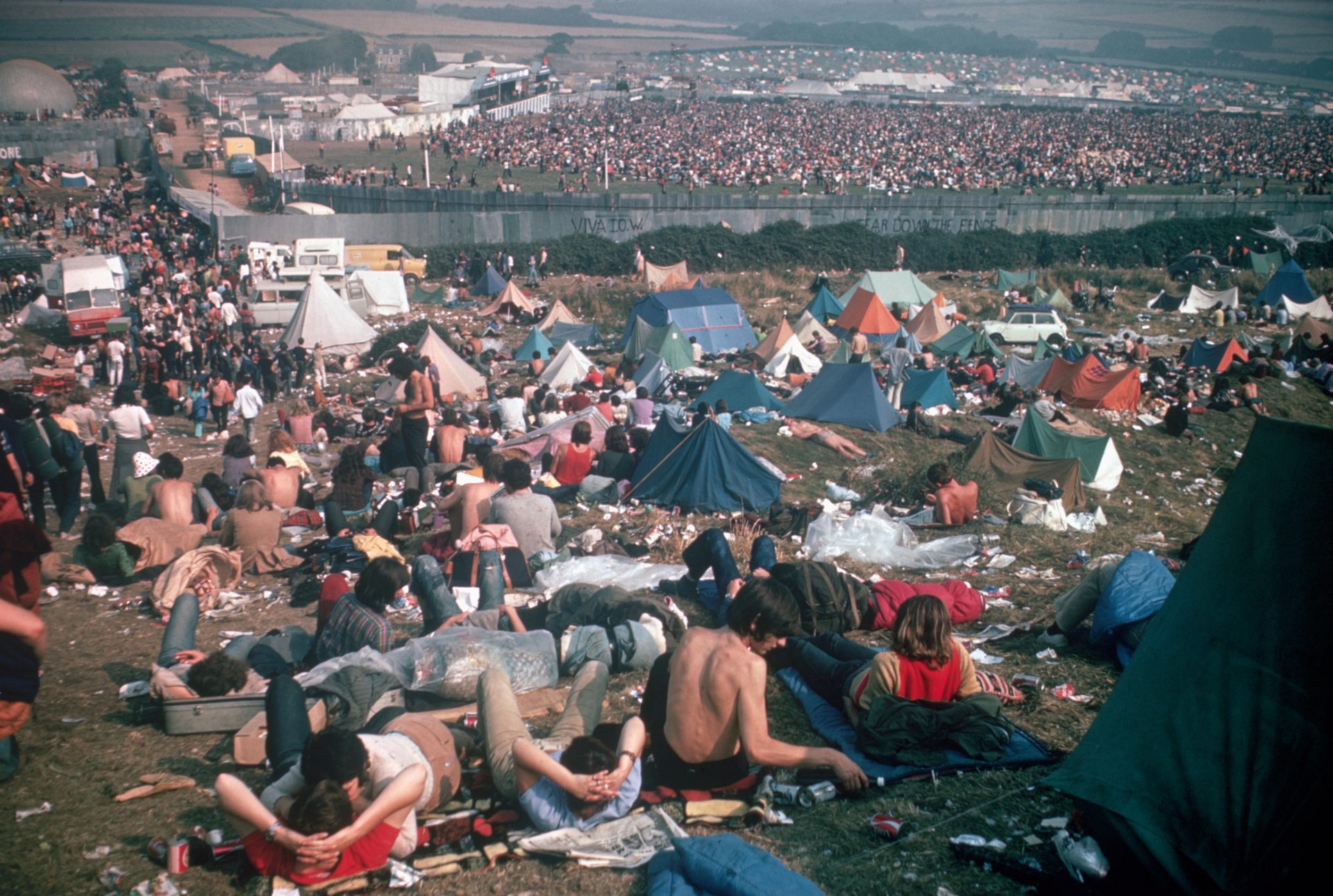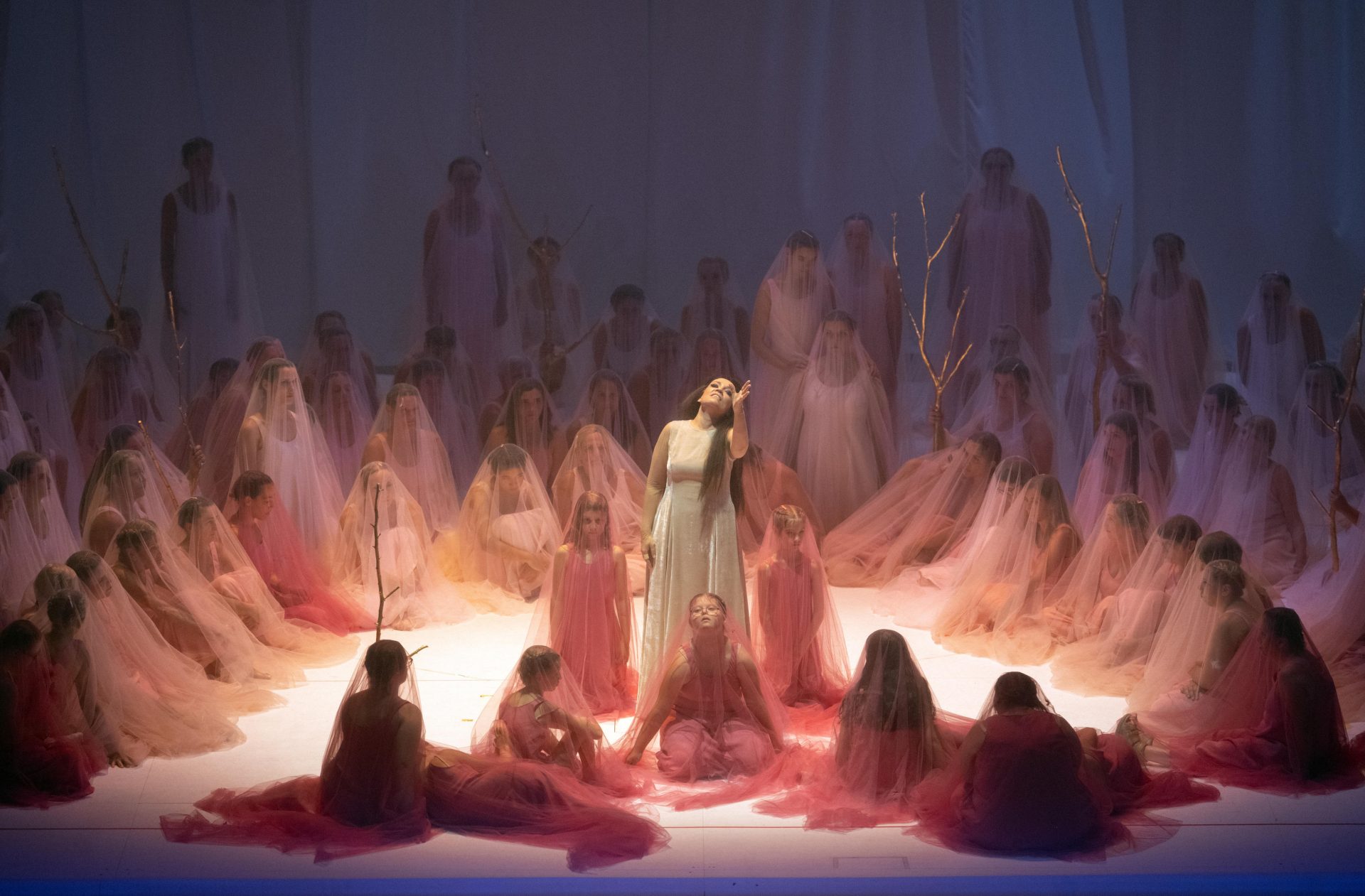
The Isle of Wight Festival can claim to have invented the British music festival as we know it. Predating the inaugural Glastonbury Festival by two years, the 1968 festival was a relatively small affair of perhaps 10,000 people, but the following year’s event attracted as many as 15 times that number and went down in history for the return to the stage of Bob Dylan after three years’ absence.
But it was the 1970 Festival – often referred to as the ‘British Woodstock’ and staged just days after its American counterpart – which became notorious. It was also the event that signalled the Festival’s demise before it really began and, despite the very British setting, the way it played out was heavily influenced by forces from across the Channel.
The 1970 Festival was stymied by the massive attendance figures – as many as 700,000 – and the inevitable chaos they caused. Local MP Mark Woodnutt reported to the Commons that he had “spent two days at this festival incognito in my hippie outfit and the scene both during and after the festival was one of indescribable squalor and filth”. He spearheaded the Isle of Wight County Council Act 1971 which effectively banned future festivals there. The event wasn’t staged again for another 32 years – this weekend it makes another comeback after being cancelled in 2020 and rescheduled from its usual June date this year.
But there were other problems for the 1970 Festival organisers. ‘Devastation Hill’, overlooking the festival grounds, was promoted as the site of an alternative event by radical group the British White Panthers, whose head Mick Farren was also editor of the International Times and whose Phun City free festival in Sussex the previous month had been a disaster. Farren’s mouthpieces decried the security patrolled metal fences as making the Isle of Wight Festival akin to a prison camp and criticised the £3 entry fee as representative of “capitalist interests seeking to exploit the energy of the People’s music”.
By the time the festival was in full swing, the BBC was reporting that some 15,000 ticketless “hippies, weirdies, beatniks, dropouts and just plain old-fashioned pop fans” were camping on Devastation Hill.
But there were also other disruptive presences on the hill. In the wake of the 1968 student riots in Paris, Europe was alive with political radicalism, and a group of French agitators had made their way to this island of tea rooms and yacht clubs to try to re-make the event in their own image.
Jean-Jacques Lebel was at the forefront of the French attempt, joined by Dutch and German student radicals, to raise the revolutionary consciousness of the revellers. Lebel was plugged into everything radical happening in art, philosophy and activist politics on the Continent. He had staged the first ‘happening’ in Europe back in 1960 and was involved with surrealism, Dadaism, Situationism and Fluxus. He was a close friend of the post-structuralists Gilles Deleuze and Félix Guattari and had been a leading figure in Paris in May 1968.
Lebel had nothing but contempt for both the crowd and the performers at the 1970 Festival, remarking “Only vegetables can spend three days and nights without food, packed like cattle into a filthy arena surrounded by walls and private guards and police dogs and not even protest, just because music is being played”, and criticising the “completely out of touch” millionaire rock stars.
Those rock stars were only too aware of this radical European element. Joni Mitchell, who played a tense set on the Saturday, later remembered that “A handful of French rabble-rousers had stirred the people up to feel that we, the performers, had sold out because we had arrived in fancy cars”. Pete Townshend remarked on the dominance of the Europeans at the festival, “We come home and find ourselves playing to a load of bloody foreigners”.
Things finally came to a head on the final day of the festival when the French radicals, joined by the Hell’s Angels, led a successful breach of the fences. Later that day the organisers gave up and declared it a free festival. The radicals claimed victory and thus, even at its inception, the countercultural dream of the music festival as a locus of freedom and equality, as well as a platform for music stars to seal their iconicity, was challenged.
But artist and activist Caroline Coon, who was there in 1970, was critical of the troublemakers years later, telling the Guardian, “Anarchy is always a parasite. They weren’t liberating the Food Hall in Harrod’s, were they?”, and it might be argued that it was the philosophy of peace and love, whose passivity so irritated the revolutionaries, that really won the day.
Overall, the festival had been remarkably peaceful given the huge numbers involved and the hippy philosophy, however much it has been caricatured and derided since, played a large part in that. Paradoxically, here at one of the defining events of the counterculture, the wisdom of the moderate was proven.
The Isle of Wight Festival in 1970 in five songs
The Who, Heaven and Hell (1970)
The opening song of The Who’s epic early hours set inadvertently summed up the differing experiences of the festival’s revellers, some remembering it as the apotheosis of the countercultural ideal, others as a disorganised nightmare.
Jimi Hendrix, Foxy Lady (1967)
Hendrix’s Sunday set was one of his last appearances – he died in London 19 days later.
Free, All Right Now (1970) Free performed on the Sunday, but their song was played so much on the Festival’s sound system it became its anthem. A UK No. 2 hit earlier in the month, it had been kept off the top for weeks by Mungo Jerry’s In the Summertime.
Bob Dylan, Desolation Row (1965) Dylan’s 1969 performance had been the making of the Isle of Wight Festival. The following year, ‘Devastation Hill’, the illegal camp outside the festival grounds, also became referred to as ‘Desolation Row’ after this track.
Joni Mitchell, My Old Man (1971)
The performance of this song from the yet to be released Blue marked Mitchell’s recovery of her set after it was interrupted by one ‘Yogi Joe’, who seized the microphone and proclaimed “Desolation Row is this festival, ladies and gentlemen”.
Now hear the extended playlist:



